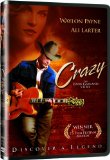| Reviews & Columns |
|
Reviews DVD TV on DVD Blu-ray 4K UHD International DVDs In Theaters Reviews by Studio Video Games Features Collector Series DVDs Easter Egg Database Interviews DVD Talk Radio Feature Articles Columns Anime Talk DVD Savant Horror DVDs The M.O.D. Squad Art House HD Talk Silent DVD
|
DVD Talk Forum |
|
|
| Resources |
|
DVD Price Search Customer Service #'s RCE Info Links |
|
Columns
|
|
|
Crazy (2007)
Author's Note: Since this review is based on a screener copy, all evaluations of video, audio and extras are subject to change, should we receive the final shelf copy.
Screen Media has released Crazy, the 2007 indie bio-pic of legendary country/jazz guitarist Hank Garland, starring musician/actor Waylon Payne and Ali Larter. A standard, thoroughly familiar (yet superficially enjoyable) bio-pic, Crazy does sport a better-than-average production design for a low-budget entry, along with an infectious soundtrack that will no doubt spur on viewers to sample Garland's talents. A buy, though, will depend on how heavily you're into Garland or the two stars.
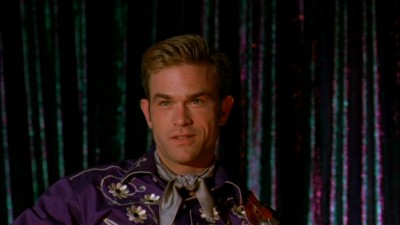
According to Crazy, Garland's story begins in 1945, when 15-year-old Hank wows the audience--and Hank Williams (Steve Vai)--with his debut on the Grand Old Opry program. Flashforward ten years, and Hank (Waylon Payne) is one of the hottest session musicians in Nashville, running from one studio to the next for the likes of Elvis (Jason Allan Smith), Roy Orbison (Brian Jones), and Patsy Cline (Mandy Barnett)...while also achieving the status of one of Nashville's most accomplished studs, pulling a neat little trick with his fret board by shining a reflection off it into a waiting cutie's eyes in the audience. Things aren't so easy-going, though, in the recording studios, where Hank's perfectionism along with his refusal to sign away his talents without recognition (and a bigger payday), causes friction with the suits that run the "Nashville Mafia" of interconnected record producers, musician unions and the production companies. Chief irritant to Hank is smarmy record executive Ryan Bradford (David Conrad), who knows Hank is contributing a lot more to these famous records than he's getting credited for...and who doesn't care one bit. Even more troublesome for the guitarist is his desire to expand his musical repertoire into the jazz world--the black jazz world--a taboo practice at that time in country music history; one that results in further tension between Garland and the "Nashville Mafia." But none of that strife can compare to the seismic shocks created by the appearance of sexy blonde siren Evelyn (Ali Larter), who manages to snag Hank into marriage...before she realizes he's already married to his music and the road--with tragic results for both lovers.
SPOILERS ALERT!
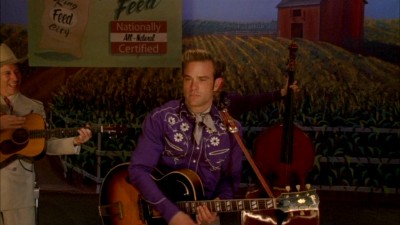
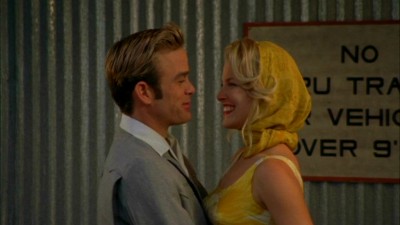
To be honest, I didn't know a thing about Hank Garland's life before watching Crazy (a ham-handed, inappropriate title, by the way). I've certainly encountered his name time and again in the bios I've read about Elvis and other musicians from that era, but other than his famous Sugarfoot Rag and some licks on his collaborations with Elvis and Patsy Cline, I wouldn't have been able to pinpoint his place in country/pop/jazz music history for you. Watching Crazy, though, a newcomer might get a distinct feeling of déjà vu for Garland's life, since so much of it seems to be filtered through recent musical bio-pic constructions like Ray and Walk the Line, and through the line of other standardized musical bios like La Bamba and The Buddy Holly Story (and all the way back to fictionalized Hollywood fare likeYour Cheating Heart and Night and Day, if you want to be thorough). Bio-pics have never been known for their fidelity to the facts, nor on the other hand should historical accuracy be taken too seriously as a determiner of whether or not a movie is entertaining (name the most accurate bio-pic you can think of...and I'll guarantee some dramatic license has been taken with it). The casual moviegoer may not fully register that "Inspired by a legend," title card that pops up in the first few minutes of Crazy, but "inspired" and "legend" are potential warning flags not to take this movie too seriously as historical biography.
Indeed, after looking up Garland's life story (in an admittedly cursory fashion--we're movie reviewers here, not accredited historians), what was left out of Crazy sounds a mite more interesting than what may or may not have been fabricated here. Reading up on Garland, the two most interesting aspects of his life seem to be his influence not only on other Nashville guitarists and the evolving "Nashville sound," but also his efforts to bring country talent into the jazz world, as well as his struggle to recover his guitar skills after a horrific car crash left him incapacitated for years. However, in Crazy, the former element isn't properly developed, and the latter is shaped along questionable lines of melodrama that may or may not be true. Whenever Crazy stays in the recording studio, or shows Garland obsessively fingering his guitar, working on a new lick, the movie comes off quite well. Those scenes may play familiar, what with Garland's stiff-necked opposition to the producers who "stole" his music and his womanizing ways with groupies looking awfully similar to other music bio-pics. But "familiar" isn't necessarily bad, and we can get pleasure from expected genre conventions.
However, not nearly enough of Garland's actual ground-breaking career has been highlighted to indicate to Crazy's audience that this musician was special and unique. The three or four bios of Garland I read online seem to offer quite a bit of fascinating information on his rather remarkable rise from boy-prodigy on the guitar to young superstar session player, to searching artist looking to expand his horizons in the world of jazz (this element in particular is poorly developed, used more as story crux here to mouth a few standard clichés about racism in 1950s Nashville rather than as a ground-breaking act by Garland that helped, in some small way, to evolve both genres of music). But very little of that makes it into Crazy; sketchiness of intent is masked by conventional melodramatic set-ups over groupies and road temptations and drunken friends and bad marriage scenes, and Garland's life quickly becomes, "The Fill-In-The-Blank Musician Bio-Pic Story." In the bios I read, Garland's marriage to Evelyn isn't even mentioned: his music and his tragic accident are clearly the most important aspects of his legacy. But Crazy says different, and that's fine by me, especially if it's true (you're always taking a chance relying on internet info)...had that marriage as portrayed on the screen held some unique appeal or at least a clear storyline arc. But it hasn't any special appeal here, moving along plot lines we've seen in countless other melodramas (she's a party girl and he's a womanizer, but she tames him...for the moment, at least, before he leaves her emotionally, after which she leaves him physically, blah, blah, blah).
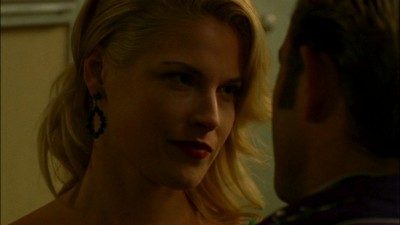
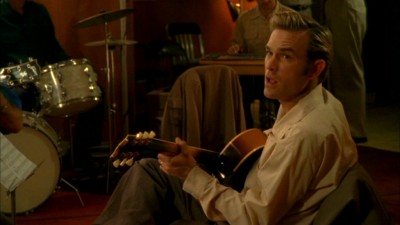
And seemingly critical points within that marriage subplot are introduced and dropped without explanation. What's the point of bringing up Evelyn's wariness over Hank's friends, white or black, or her eventual sexual degradation at the hands of producer Ryan, if the screenwriters aren't going to either explain them or elaborate on their importance? Don't get me wrong; I'm as interested as anyone else in seeing the corrosively erotic Larter getting nailed from behind while someone else in the room watches. But what, exactly, does that have to do with Hank's story? Or Evelyn's, for that matter? Sure, it sets up Hank's jealousy, but clearly there's more to Evelyn's act that needs explaining, but we never get it in Crazy. As for Hank's sudden mental lapses once he's married to Evelyn, they're neither foreshadowed in his earlier scenes, nor explained in any way during the rest of the picture. Before we know it, Hank's being carted off to the looney bin and getting electroshock, which apparently reduces him to Randle Patrick McMurphy status on his SAT scores (Payne isn't very convincing in these lamentable scenes). Where did that come from? Are the writers and director of Crazy suggesting that Hank had some form of mental illness, exacerbated by his super-charged relationship with his sexy wife? Cool...let's dramatize that. Or at least reference it or try to explain it in some exposition. Normally, I don't have a problem with filmmakers playing with the truth in docu-dramas because that's the nature of the beast, but nothing I read suggested Garland even had mental problems brought on by his marriage or electroshock--everything I read said his brain damage came after a horrific car wreck--a wreck that comes before Hank's emotional breakdown in this movie. In the end, that "may-or-may-not-be" fabrication doesn't matter much, because the presentation of his mental illness is so familiar and frankly at times, desultory, that we don't take it very seriously--especially since the context is eliminated, as well (we can't experience the loss of his skills, if we're not sufficiently clued in to how important Garland was in country music and jazz).
On the big plus side of Crazy, we get to hear what I assume are original recordings of Garland in action (if they're not, they're good approximations, along with the sound-alikes for Cline, Presley and the rest), while the production design is really first-rate for a low-budget indie (the furnishings in particular, are spot-on, and the cinematography evocative and lush). As for the lead performers, I don't think I've seen Waylon Payne in anything except Walk the Line, but he's effective at times here, particularly when he's showing Garland engrossed in his music. If he's less convincing in his scenes with Larter (he looks scared of the statuesque blonde in their first bantering seduction scene together) or when he's blowing his cool, chalk it up more to sketchy motivation in the script than any deficiency in acting chops. As for Larter, the only thing she's done that sticks in my head is ripping off her coat, down to her undies, in that silly Obsession movie trailer (that was fun for about two weeks on TV), but outside the initial "wow" factor of her looks, I found her quite good here. Erotic, she has down. The director gives her a terrific slow-motion introductory shot, looking cool and sexy in a form-fitting dress, that reminded me of the old Hollywood sirens (and there's a memorable moment where she tosses her gorgeous mane of platinum blonde hair around as she admires herself in a mirror that gave me the vapors). In her dramatic scenes, I found her vulnerable and believable as the party girl that finds love and then "gets lost" when she loses that love. It's a solid turn for the actress, giving the film's familiar love story a bit more heft.
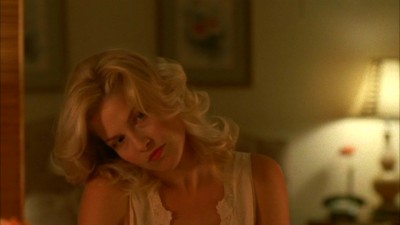
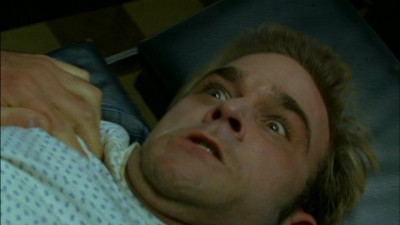
The DVDs:
The Video:
The 16x9 enhanced, 1.78:1 widescreen transfer does suffer from some compression issues (jaggies here and there and a softer image than I expected), but the color values are bright. Overall, acceptable.
The Audio:
Much better is the Dolby Digital English 5.1 stereo mix, which forcefully brings Garland's music over. Not much opportunity for separation effects, but the levels are terrific. No subtitles or close-captions are available on this screener copy.
The Extras:
We received a screen copy for Crazy that boasted a director's commentary and an interview with the real Hank Garland, both of which might have cleared up some questions that were raised but not fully explained in the film (and in this review, probably). Sadly, neither were actually included on this screener disc--not a good move, Screen Media.
Final Thoughts:
If you've seen one generalized, standardized, conventionalized musical bio-pic, you have seen them all, cowboy. That said, it's not an unpleasant genre format, and the music of Hank Garland is first-rate here. Waylon Payne has his moments as the great Nashville guitarist, while sexy Ali Larter is quite good as a "wronged woman" wronged once again in love. Probably a solid buy for fans of the stars and Garland, while viewers who liked Walk the Line and Ray won't mind a rental of Crazy.
Paul Mavis is an internationally published film and television historian, a member of the Online Film Critics Society, and the author of The Espionage Filmography .


|
| Popular Reviews |
| Sponsored Links |
|
|
| Sponsored Links |
|
|
| Release List | Reviews | Shop | Newsletter | Forum | DVD Giveaways | Blu-Ray | Advertise |
|
Copyright 2024 DVDTalk.com All Rights Reserved. Legal Info, Privacy Policy, Terms of Use,
Manage Preferences,
Your Privacy Choices | |||||||









